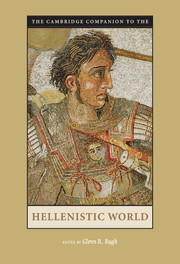Book contents
- Frontmatter
- Introduction
- 1 Alexander the Great and the Creation of the Hellenistic Age
- 2 The Hellenistic Kingdoms
- 3 The Polis and Federalism
- 4 Hellenistic Economies
- 5 The Hellenistic Family
- 6 History and Rhetoric
- 7 Material Culture
- 8 Hellenistic Art: Two Dozen Innovations
- 9 Language and Literature
- 10 Greek Religion: Continuity and Change in the Hellenistic Period
- 11 Philosophy for Life
- 12 Science, Medicine, and Technology
- 13 Hellenistic Military Developments
- 14 Greeks and Non-Greeks
- 15 Recent Trends and New Directions
- Hellenistic Dynasties
- Works Cited
- Index
1 - Alexander the Great and the Creation of the Hellenistic Age
Published online by Cambridge University Press: 28 November 2007
- Frontmatter
- Introduction
- 1 Alexander the Great and the Creation of the Hellenistic Age
- 2 The Hellenistic Kingdoms
- 3 The Polis and Federalism
- 4 Hellenistic Economies
- 5 The Hellenistic Family
- 6 History and Rhetoric
- 7 Material Culture
- 8 Hellenistic Art: Two Dozen Innovations
- 9 Language and Literature
- 10 Greek Religion: Continuity and Change in the Hellenistic Period
- 11 Philosophy for Life
- 12 Science, Medicine, and Technology
- 13 Hellenistic Military Developments
- 14 Greeks and Non-Greeks
- 15 Recent Trends and New Directions
- Hellenistic Dynasties
- Works Cited
- Index
Summary
“The name of Alexander marks the end of one age of the world, the beginning of another.” This lapidary and much-quoted apophthegm is the starting point of Johann Gustav Droysen’s revised Geschichte des Hellenismus.It appeared in 1877, when Droysenwas in his seventieth year, at the peak of his powers and reputation, and the republication was a tribute to the notoriety that his work had achieved at the time of Germany’s unification. His vision of the Macedonia of Philip and Alexander was not intended as a political manifesto for the present, but it was eagerly seized upon as foreshadowing what could be achieved by the German states united under the leadership of the Prussian monarchy. An autocratic regime, based on enlightened cultural and political principles, had first conquered and then civilized the world, and the process might be repeated in the modern era. Under those circumstances, it was easy to accept the picture of Alexander as the inaugurator of a new age, and Droysen’s conceptual model, despite some protests, has been almost universally accepted. Alexander, consciously or unconsciously, created a new world informed by Greek culture and absolute monarchy, which lasted until the dominance of Rome as a world power, and Droysen termed the process “Hellenismus.” This was not entirely novel, for the term had been in vogue as a label for the Greek koine as spoken and written by non-Greeks in the eastern Mediterranean after Alexander, but Droysen extended it from a merely philological concept to encapsulate what he saw as the essence of a whole epoch.
- Type
- Chapter
- Information
- The Cambridge Companion to the Hellenistic World , pp. 9 - 27Publisher: Cambridge University PressPrint publication year: 2006
- 7
- Cited by



